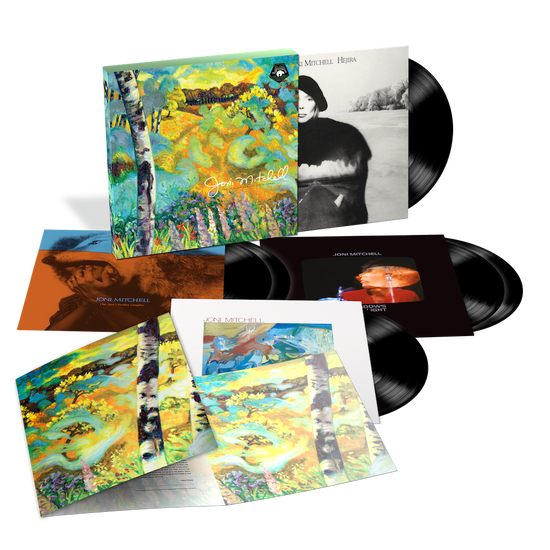Asylum Albums 76-80

Published 2024-05-26 06:00
After "The Hissing Of Summer Lawns" tour, Joni Mitchell retreated to Neil Young’s beach house to recover. Eager to travel, but undecided about a destination, Mitchell was unexpectedly invited on a cross country road trip with friends. It was one of 3 road trips she took between 1975 and 1976 and the beginning of a period defined by wanderlust, both in her physical travels and musical exploration. This transformative phase is the focal point of "The Asylum Albums 1976-1980", the next release in the "Joni Mitchell Archives" series.
The new collection showcases Mitchell at her most daring across "Hejira", "Don Juan's Reckless Dughter", "Mingus", and the live album "Shadows & Light". Renowned audio engineer Bernie Grundman remastered all 4 releases included in this boxed set from the original flat analog master tapes.
During this period, Mitchell boldly declared her move from the 'hit department' to the 'art department'. Critics were slow to catch up, but her creativity was in overdrive. Instead of session aces, she began recording with jazz virtuosos like Larry Carlton and Pat Metheny on guitars, Michael Brecker on saxophone, Herbie Hancock on keyboards, and Don Alias on percussion, as well as several members of Weather Report, including Jaco Pastorius, bass, and Wayne Shorter, saxophone.
"Hejira" stands out as a testament to Mitchell’s artistic evolution. Its subdued instrumentation, coupled with her introspective lyrics, resulted in timeless tracks like “Coyote” and “Furry Sings The Blues” with Neil Young on harmonica. Mitchell once said, “I suppose a lot of people could have written a lot of my other songs, but I feel the songs on 'Hejira' could only have come from me”.
Her journey continued with "Don Juan's Reckless Daughter", a double album of largely experimental music. It included “Paprika Plains”, a side long piano piece with orchestral arrangements. It found a receptive audience in musical seekers like Bjork, who said the album’s fearless approach later inspired her music.
Ultimately, Mitchell’s path led to "Mingus", her collaboration with jazz titan Charles Mingus, who wrote several songs for the project. Mingus died shortly before the album was complete, and Mitchell dedicated it to him. 4 songs by Mingus with lyrics written by Mitchell appeared on the album, including a version of “Goodbye Pork Pie Hat”, Mingus’ tribute to saxophonist Lester Young, and one of his most famous compositions. In the album’s liner notes, Mitchell said she felt fully immersed in jazz for the 1st time while making the record. “It was as if I had been standing by a river, one toe in the water, feeling it out, and Charlie came by and pushed me in, sink or swim”.
The final entry is the double live album "Shadows & Light". It was Mitchell’s 2nd live album and her last release with Asylum Records. She recorded it during the tour for "Mingus" in September 1979 at the Santa Barbara Bowl. Except for the performance of her classic song “Woodstock”, the album focused on songs from her most recent albums, like “Amelia”, “Dreamland”, and “The Dry Cleaner From Des Moines”, The Persuasions, a vocal group popular in the 1960's, also appeared on 2 songs, the title track and a cover of “Why Do Fools Fall In Love”.
The cover art for "The Asylum Albums 1976-1980" includes a portion of one of Mitchell’s original paintings. Fans will enjoy a full version of the whimsically abstract landscape as an accompanying insert included in the album packaging for both the CD and LP configurations. Accompanying the set is a heartfelt essay penned by Oscar winning actress Meryl Streep, a lifelong fan of Mitchell’s work.
Rhino Records, June 21st, 2024.